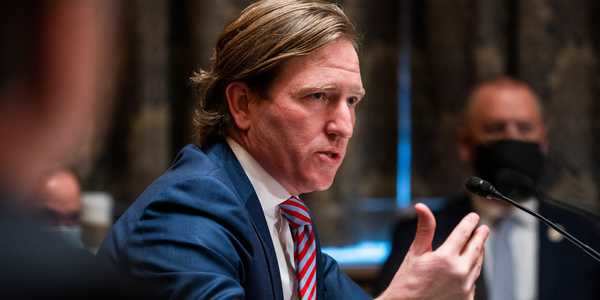TOM PORTERJUL

Some experts doubt the truth of papers obtained by the Guardian purporting to come from the Kremlin.
According to form US cyber chief Chris Krebs, they may be part of a disinformation campaign.
The papers purport to confirm a secret Russian plot to help Donald Trump win power in 2016.
Former US cyber security chief Chris Krebs and other disinformation experts voiced skepticism of the authenticity of documents apparently revealing a secret Kremlin plot to help Donald Trump win power.The Guardian published a report based on the documents on Thursday. It says they describe Russian President Vladimir Putin approving a plan to covertly help Trump win the US presidential election at a security council meeting in January 2016.
Russian security experts told the newspaper that details in the documents and other information indicated they were likely authentic, but the publication did not reveal how it obtained them or publish its evidence.
Krebs was appointed to lead the Department of Homeland Security's cybersecurity division by Trump in 2017, and was fired by the president after pushing back against the president's claim that last year's presidential election was tainted by mass fraud.
He was was not convinced of the authenticity of the documents."This is far too convenient & reeks of #disinfo operation. It could all be individually or collectively true and at the same time planted & fake," he tweeted.
Krebs was writing in response to a tweet by Thomas Rid, an expert in Russian disinformation and a political science professor at Johns Hopkins University, who noted lack of clarity regarding the source of the documents."This Guardian story is likely to make big waves. I would remain somewhat cautious for now, however. For a "leak" of this magnitude, we need at least some details on the chain of custody. Also note the Guardian's own hedging ("papers appear to show")," he tweeted.
 President Donald Trump (L) and Russian President Vladimir Putin arrive to waiting media during a joint press conference after their summit on July 16, 2018 in Helsinki, Finland. Chris McGrath/Getty ImagesThe documents provoked a furious response from Trump on Thursday, who in a statement described them as "disgusting" and "fake news." A Kremlin spokesman described the account as "pulp fiction."
President Donald Trump (L) and Russian President Vladimir Putin arrive to waiting media during a joint press conference after their summit on July 16, 2018 in Helsinki, Finland. Chris McGrath/Getty ImagesThe documents provoked a furious response from Trump on Thursday, who in a statement described them as "disgusting" and "fake news." A Kremlin spokesman described the account as "pulp fiction."The Guardian did not immediately respond to a request for comment.
The documents purport to confirm longstanding claims that Russia launched a wide-ranging operation to back Trump's candidacy in 2016, and to reveal its motives for doing so.According to the papers, the Kremlin believed that Trump was "mentally unstable" and that his presidency would divide and weaken the US.
It also contains apparent confirmation that the Kremlin possessed compromising personal information about Trump, a claim that has been the subject of lurid rumor since the publication of a notorious dossier by former UK spy Christopher Steele in 2016.
The dossier contained unverified claims that Trump had been recorded cavorting with prostitutes in a Moscow hotel room, and alleged that the material could be used by Russia to gain leverage over him.But according to declassified footnotes from a Justice Department inspector general report on the dossier, that claim may itself have been fed to Steele as part of a Russian disinformation campaign.
Fiona Hill, who advised the Trump administration on Russia policy, said in congressional testimony in 2019 that the Kremlin's goal was to undermine whoever entered the White House in 2016.
No comments:
Post a Comment